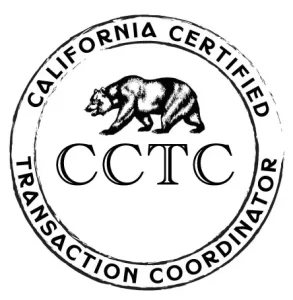Initially, many real estate agents handled all administrative aspects of a transaction themselves, but as their client base expanded, the need for dedicated support grew. The advent of electronic document management systems and real estate transaction management software significantly facilitated the work of transaction coordinators, allowing them to efficiently track deadlines, documents, and communication across multiple parties.With increasingly stringent real estate regulations, transaction coordinators became crucial for ensuring all necessary disclosures, forms, and legal requirements were met throughout the transaction process. As the role evolved, some transaction coordinators began specializing in specific areas like contract management, title coordination, or closing procedures, depending on the needs of the brokerage or agent.
 CALIFORNIA CERTIFIED TRANSACTION COORDINATOR
CALIFORNIA CERTIFIED TRANSACTION COORDINATOR